sherwink
sherwink
Read about some of our most beloved Saints and Martyrs.
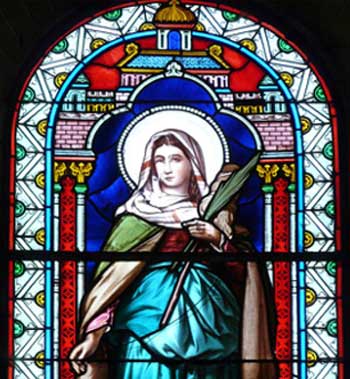
The Holy Martyr Solangia of Berry
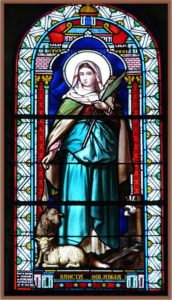
The Holy Martyr Solangia of Berry (880)
Feast Day: May 10
Saint Solangia (or Solange) was born to a poor but pious family in the small market town of Villemont, twelve kilometers from Bourges, in France. A pious child, at age seven, she consecrated her virginity to the Lord. As she shepherded, she remained in constant prayer, and was bestowed gifts; some claimed that even her presence healed the sick and cast out demons. Endowed with great beauty, she rejected the advances of a nobleman, Bernard of the Gothic people, the son of the count of Poitiers, who was smitten by her beauty and popularity. He argued with her to become his wife, and finally decided to kidnap her. At night, he prevailed over her on his horse. Solangia struggled violently and slipped from the horse while he was crossing a stream. Vexed, he cut off her head. According …
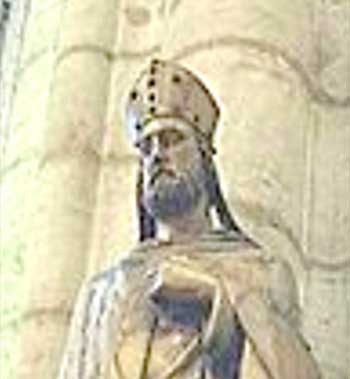
Saint Nicetius of Lyons
Saint Nicetius of Lyons (775)
Feast Day: April 2/15
Saint Nicetius (or St. Nizier de Lyons) was born in 513 at Geneva, then capital of the Burgundy kingdom. His mother was named Arthemia. His father, Senator Florentinus, married and already the father of two children, had refused the bishopric of that city. But the child was destined for the Church, and his mother had the premonition that he would become a bishop. His name in Latin was Nicetius, itself formed from the Greek Νικήτης, the Conqueror, and it was given in French as Nisier, then Nizier.
He was already in the clerical state when his father died, and he remained with Arthemia, his mother. An malignant ulcer on his face put his life in danger,his mother prayed to Saint Martin of tours, who appeared, made over him the sign of the cross, cured him and ordered him to arise. …
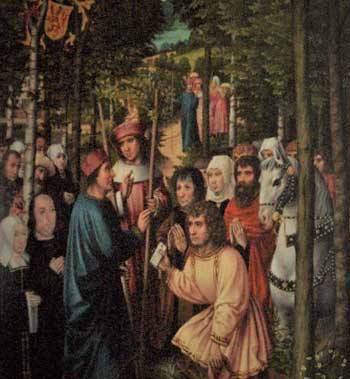
Saint Rumold of Malines
Saint Rumold of Malines (775)
Feast Day: July 1/14
Saint Rumold (or St. Rombaut de Malines, or Mechelen) was born at the beginning of the eighth century, the son of David, a Scottish king, and Cecila, a Sicilian princess. He had faithfully served God for many years as a monk in his own country, when zeal for the salvation of souls induced him to preach the faith to the idolaters. He made a journey first to Rome, were he was consecrated a bishop, and with the blessing of the Pope went to Brabant (modern-day Belgium), a great part of which country about Malines he converted. He had a great desire for martyrdom. For having rebuked two men for the wickedness of their lives (meanness and fornication), they slew him and threw his body into the river. It was miraculously recovered by fishermen when at night, a light shone into …
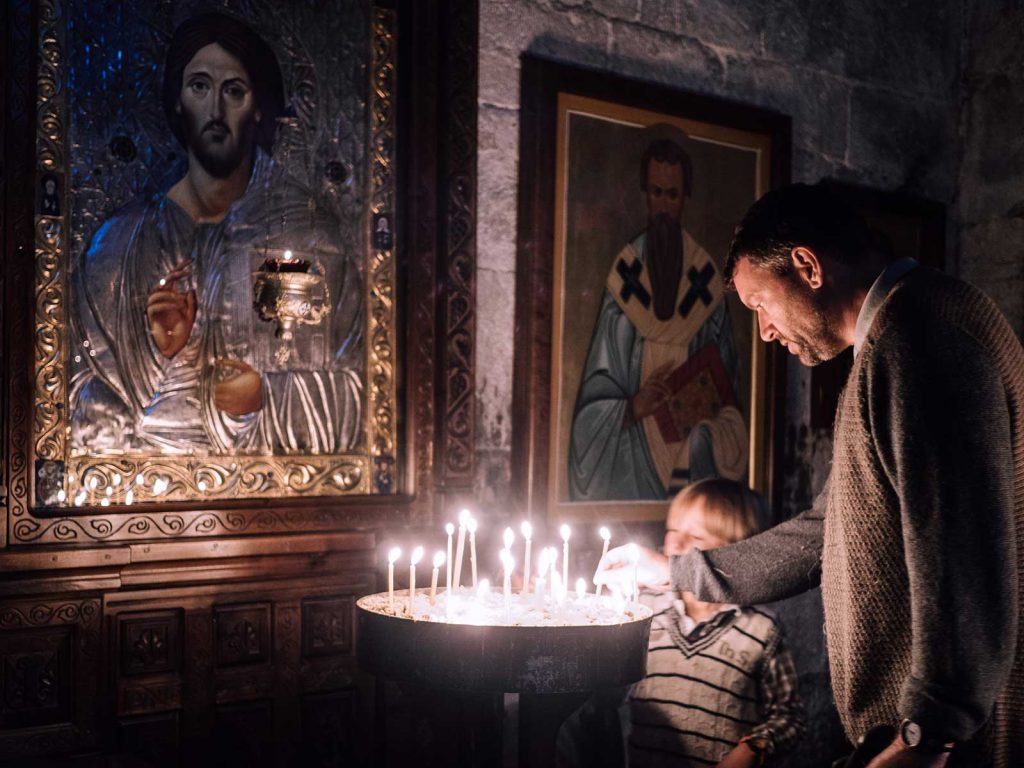
How Does an Orthodox Christian Confront an Economic Crisis?
Download this article
Foreword
In 2009, I had the privilege of being a guest at the home of Ioannis and Katerina Kallianiotis. It is always a spiritually profitable experience when I am blessed to be in the home of pious, Orthodox Christian laity. The conversation was always edifying. Ioannis shared stories of his youth on a Greek island, far from the mainland. I recalled my time in Greece, where every Sunday after the Divine Liturgy the faithful gathered in parks or homes and where they had a tradition of ‶lay theologians″ who would speak on various topics. In Ioannis, I saw the sagacity of a lay theologian.
Upon understanding his accomplishment of being published in every Mount Athos journal, I pleaded with him to write something for American Orthodox Christians. At that time the world faced the challenges of the 2008 economic crisis, so I asked him to pen …
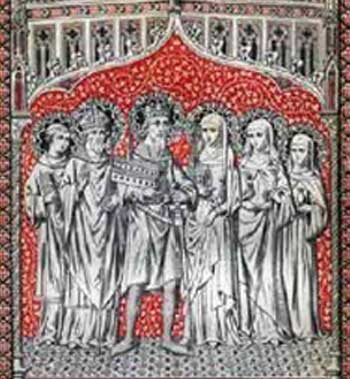
Saint Waldetrudis of Mons
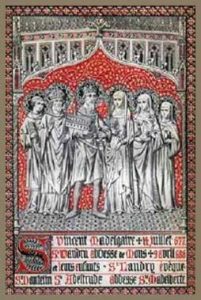
Saint Waldetrudis of Mons (688)
Feast Day: April 9/22
Saint Waldetrudis (or Waltrude or Waudru) was born in the time of Dagobert I, who was king of the Franks from 629 to 638. Fidelity was her virtue as a bride and as a mother, then as a nun and as a hegumeness (abbess). She died on 9 April 688: she had then, between fifty and sixty years. Several decades later, her body was taken from the earth by Saint Hubert, bishop of Tongres, Maastricht and Liège. In 1250, on 12 August, her head was separated from the body in the presence of Nicholas, the bishop of Cambrai. In 1349, on 7 October, her relics were carried in procession in the streets of Mons, in order to obtain the cessation of the plague. Each year, the day after the feast of the Trinity, that is, on Second-day [Monday] after our …
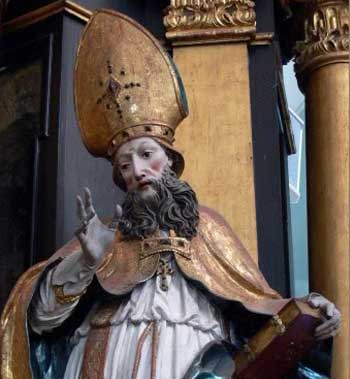
Saint Hilary of Arles
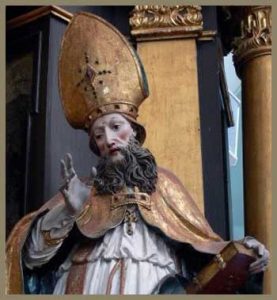
Saint Hilary of Arles (449)
Feast Day: March 30/April 12
Saint Hilary (or Hilarius) was born to a noble family in Lorraine, in northeastern Gaul (modern-day France). While still a youth, he sold his inherited estates to his brother, gave the profit away to the poor, and joined the abbey of Lerins on the island of Lerina, headed by his kinsman, St. Honoratus (an uninhabited island until Honoratus founded the monastery there, and since has been renamed to Saint-Honorat). After being elected bishop of Arles (in southern Gaul), Honoratus died, and Hilary was named his successor. He desired to stay isolated on the island, but accepted the episcopate as the will of God and went to serve the Church. He was esteemed for his great sanctity of life, and known for his ascetic deeds, strictness, almsgiving to the poor, and ransoming captives. Twice, he had difficult confrontations with Saint …
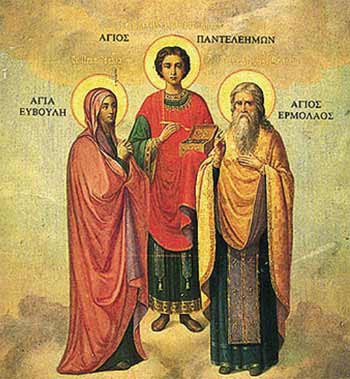
Saint Euboula
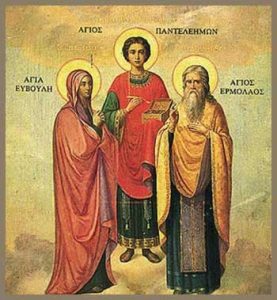
Righteous Euboula, Mother of Saint Panteleimon (304)
Feast Day: March 30/April 12
Euboula signifies in Greek: “good counsellor”. It is the name which the mother of the holy Megalomartyr Panteleimon bore. She lived in the city of Nicomedia, in Bithynia (at the northwest of Asia Minor, on the border of the Euxine Sea), and she had espoused a pagan with the name of Eustorgios. When a son was born to them, the father named him Pantaleon, which means in Greek: “totally a lion”. But the mother, who was a Christian, raised her son in her own faith, teaching him to confess a single true God, our Lord, Jesus Christ, and planting in his heart the inclination for an upright life and for good works. The following is known: his encounter with Bishop Anthimos and the priest Hermalaos, who made him an unmercenary healer, freely caring for the sick. A heavenly …
An Interview with Archbishop Gabriel
[vc_row row_padding_bottom=”129″ mbuilder-id=”9″][vc_column width=”4/12″ css=”.vc_column-inner.md_col-5bdd542088f0d{padding-right:9px!important;}” padding_right=”9″ 0=”10″”][md_imagebox_full imagebox_title=”Our Approach” imagebox_heading_size=”h5″ imagebox_description=”Graphic Designer with a focus on interactive design, helping clients communicate and solve problems through creative visual solutions.” imagebox_general_color=”#ffffff” imagebox_text_height=”400″ imagebox_alignment=”left” imagebox_use_background=”yes” imagebox_background=”http://theme.pixflow.net/massive-dynamic/stylish-market/wp-content/uploads/sites/75/2018/11/anete-lusina-609864-unsplash.jpg” imagebox_overlay=”yes” imagebox_overlay_color=”rgba(0, 0, 0, 0.26)” imagebox_button=”yes” imagebox_button_style=”fill-rectangle” imagebox_button_text=”Read more” imagebox_button_icon=”icon-empty” imagebox_button_color=”rgb(65, 87, 248)” imagebox_button_text_color=”#fff” imagebox_button_bg_hover_color=”rgb(84, 104, 248)” imagebox_button_hover_color=”rgb(255, 255, 255)” imagebox_button_size=”standard” imagebox_left_right_padding=”0″ imagebox_button_url=”#” imagebox_button_target=”_self” md_imagebox_full_animation_type=”fade” md_imagebox_full_animation_speed=”200″ md_imagebox_full_animation_delay=”0.0″ md_imagebox_full_animation_position=”center” md_imagebox_full_animation_show=”once” md_imagebox_full_animation_easing=”Quart.easeInOut” md_imagebox_full_parallax_speed=”1″ 0=”13″”][/md_imagebox_full][/vc_column][vc_column width=”4/12″ css=”.vc_column-inner.md_col-5bdd542088f0d{padding-left:9px!important;padding-right:9px!important;}” padding_left=”9″ padding_right=”9″ 0=”11″”][md_imagebox_full imagebox_title=”Our Mission” imagebox_heading_size=”h5″ imagebox_description=”Graphic Designer with a focus on interactive design, helping clients communicate and solve problems through creative visual solutions.” imagebox_general_color=”#ffffff” imagebox_text_height=”400″ imagebox_alignment=”left” imagebox_use_background=”yes” imagebox_background=”http://theme.pixflow.net/massive-dynamic/stylish-market/wp-content/uploads/sites/75/2016/12/melvin-thambi-730827-unsplash.jpg” imagebox_overlay=”yes” imagebox_overlay_color=”rgba(0, 0, 0, 0.26)” imagebox_button=”yes” imagebox_button_style=”fill-rectangle” imagebox_button_text=”Read more” imagebox_button_icon=”icon-empty” imagebox_button_color=”rgb(65, 87, 248)” imagebox_button_text_color=”#fff” imagebox_button_bg_hover_color=”rgb(84, 104, 248)” imagebox_button_hover_color=”rgb(255, 255, 255)” imagebox_button_size=”standard” imagebox_left_right_padding=”0″ imagebox_button_url=”#” imagebox_button_target=”_self” md_imagebox_full_animation_type=”fade” md_imagebox_full_animation_speed=”200″ md_imagebox_full_animation_delay=”0.0″ md_imagebox_full_animation_position=”center” md_imagebox_full_animation_show=”once” md_imagebox_full_animation_easing=”Quart.easeInOut” md_imagebox_full_parallax_speed=”1″ 0=”14″”][/md_imagebox_full][/vc_column][vc_column width=”4/12″ css=”.vc_column-inner.md_col-5bdd542088f0d{padding-left:9px!important;}” padding_left=”9″ 0=”12″”][md_imagebox_full imagebox_title=”Join Our Team” imagebox_heading_size=”h5″ imagebox_description=”Graphic Designer with a focus on interactive design, helping clients communicate and solve problems …